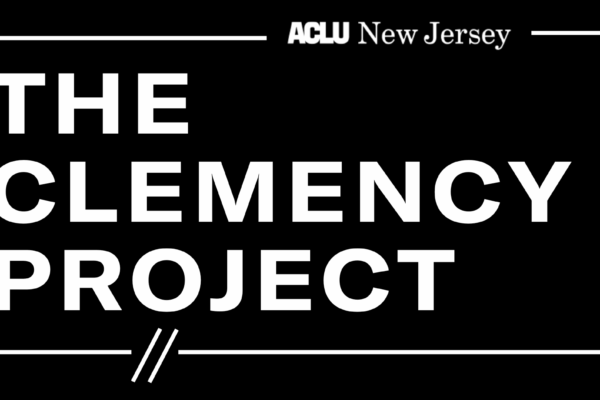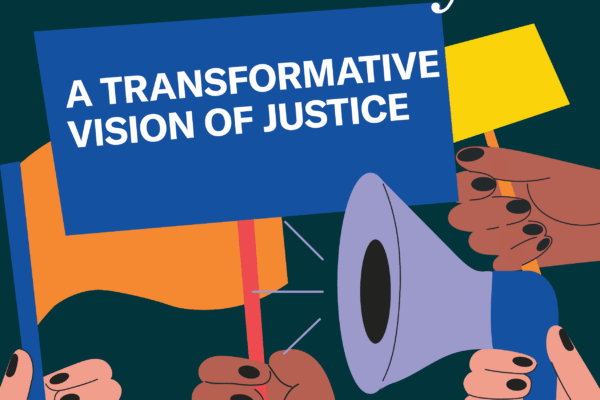The ACLU of New Jersey applauds Governor Murphy for today issuing an executive order creating an advisory board to review petitions for pardons and commutations, specifically expediting the process for people who meet specified criteria for consideration. These categories include people who committed crimes after being victims of domestic violence, sex trafficking, or other forms of sexual abuse, and people with sentences impacted by excessive trial penalties – a reference to those who are serving significantly longer sentences because they opted to exercise their constitutional right to a trial rather than agreeing to the prosecutor’s plea.
This executive order follows the ACLU-NJ's launch of The Clemency Project and is an important step toward reducing New Jersey’s incarcerated population while addressing systemic injustices and harsh sentences.
“Clemency is about more than mercy – it can be a tool to end mass incarceration. We built The Clemency Project to ensure we don’t leave any stone unturned in the pursuit of justice. I am grateful to Governor Murphy for embracing categorical clemency as a way to address injustices in the criminal legal system. We look forward to seeing the Governor fully exercise his executive power by pardoning and commuting the sentences of scores of people before the end of his term, demonstrating that New Jersey prioritizes people over punishment,” said ACLU-NJ Executive Director Amol Sinha.
In advocating for the use of categorical clemency as part of a larger decarcertive vision, the ACLU-NJ hired Rebecca Uwakwe, senior staff attorney for decarceration, in January 2023 to oversee the portfolio. In February 2024, the ACLU-NJ launched The Clemency Project to urge Governor Murphy to leverage categorical clemency before the end of his final term. As part of the project, ACLU-NJ attorneys have already begun submitting petitions for release for survivors of domestic violence as outlined in today’s historic announcement.
“Categorical clemency is a powerful tool to mitigate injustice, but it has been historically underutilized in New Jersey. Governor Murphy has broad constitutional authority to grant pardons and commutations, and today’s executive order opens a door to exercising this power on the largest scale in New Jersey’s recent history. This is an important step in redressing some of the systemic harms of the criminal legal system. We’re eager to continue submitting petitions for categorical release, and we thank Governor Murphy for taking this important step toward a fairer, more just New Jersey,” said ACLU-NJ Legal Director Jeanne LoCicero.
The ACLU-NJ has dedicated decades working toward reducing the state’s incarcerated population – victories in the courtroom and in the Legislature have contributed to New Jersey’s historic reduction in its prison population by more than 50 percent since 2011. To begin to repair the harms of mass incarceration, the ACLU-NJ has called on leaders across the state to adopt a holistic approach to decarceration that includes destigmatizing convictions and reducing the state’s prison population, which has the worst racial disparities in the country.
“Clemency is a lifeline for the people we have met with. The Clemency Project is a focused effort to mitigate injustice and address the harms of mass incarceration – and it may be the last opportunity for people to come home to their families and communities. In a state with the nation’s highest racial disparities among its incarcerated population, ensuring New Jersey leverages every tool it has available to release people from prison is fundamental to racial justice,” said ACLU-NJ Senior Staff Attorney Rebecca Uwakwe.
Categorical clemency remains an underutilized tool for criminal legal reform in New Jersey, where only 105 people have been granted clemency since 1994, prior to the executive order issued today. As an important check and balance to a criminal legal system that is rampant with injustices leveraging categorical clemency to provide a check on unjust sentences must become the expectation, not the exception.
“Long sentences and harsh punishment don't deliver safety or real accountability to survivors of crime. A more effective response is to support survivors with the services they need and facilitate repair and change among those who commit harm so that they can safely come home and be contributing members of our communities. Vera commends Governor Murphy for using his power of executive clemency to begin bringing home two groups of people currently in prison: criminalized survivors of domestic violence where abuse and trauma was a factor in their conduct that resulted in incarceration, and people who suffered the trial penalty and received longer sentences after trial than they would have had if they had pled guilty. It takes courage and clear-headedness to release people from prison who should not be there. Thank you, Governor Murphy, for helping to build a criminal legal system with more integrity,” said Marta Nelson, Director of Sentencing Reform at the Vera Institute of Justice.
"NACDL commends Governor Murphy for his bold leadership in issuing an Executive Order that supports categorical clemency, a crucial step towards rectifying injustices within our criminal legal system. By recognizing and addressing the severe impact of coercive plea bargaining and extreme trial penalties, the Governor is upholding the principles of fairness and justice. We strongly encourage him to go further and fully utilize his clemency powers to provide relief to those serving disproportionately long sentences simply for exercising their constitutional right to a trial. This action will not only help to correct past wrongs but also set a powerful precedent for meaningful reform,” said Lisa Monet Wayne, Executive Director of the National Association of Criminal Defense Lawyers.
Related Content

The Clemency Project

Decarcerating New Jersey: A Transformative Vision of Justice

Extreme Trial Penalties Are Deeply Unjust – Categorical Clemency Can Bring Justice
Stay Informed
Sign up to be the first to hear about how to take action.
By completing this form, I agree to receive occasional emails per the terms of the ACLU’s privacy statement.
By completing this form, I agree to receive occasional emails per the terms of the ACLU’s privacy statement.


